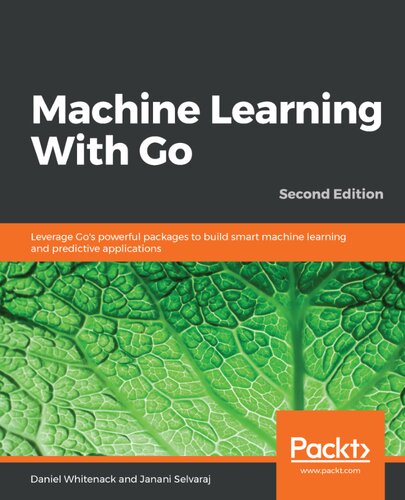

Most ebook files are in PDF format, so you can easily read them using various software such as Foxit Reader or directly on the Google Chrome browser.
Some ebook files are released by publishers in other formats such as .awz, .mobi, .epub, .fb2, etc. You may need to install specific software to read these formats on mobile/PC, such as Calibre.
Please read the tutorial at this link: https://ebookbell.com/faq
We offer FREE conversion to the popular formats you request; however, this may take some time. Therefore, right after payment, please email us, and we will try to provide the service as quickly as possible.
For some exceptional file formats or broken links (if any), please refrain from opening any disputes. Instead, email us first, and we will try to assist within a maximum of 6 hours.
EbookBell Team

0.0
0 reviewsInfuse an extra layer of intelligence into your Go applications with machine learning and AI
Key FeaturesThis updated edition of the popular Machine Learning With Go shows you how to overcome the common challenges of integrating analysis and machine learning code within an existing engineering organization.
Machine Learning With Go, Second Edition, will begin by helping you gain an understanding of how to gather, organize, and parse real-world data from a variety of sources. The book also provides absolute coverage in developing groundbreaking machine learning pipelines including predictive models, data visualizations, and statistical techniques. Up next, you will learn the thorough utilization of Golang libraries including golearn, gorgonia, gosl, hector, and mat64. You will discover the various TensorFlow capabilities, along with building simple neural networks and integrating them into machine learning models. You will also gain hands-on experience implementing essential machine learning techniques such as regression, classification, and clustering with the relevant Go packages. Furthermore, you will deep dive into the various Go tools that help you build deep neural networks. Lastly, you will become well versed with best practices for machine learning model tuning and optimization.
By the end of the book, you will have a solid machine learning mindset and a powerful Go toolkit of techniques, packages, and example implementations
What you will learnThis book is primarily for Go programmers who want to become a machine learning engineer and to build a solid machine learning mindset along with a good hold on Go packages. This is also useful for data analysts, data engineers, machine learning users who want to run their machine learning experiments using the Go ecosystem. Prior understanding of linear algebra is required to benefit from this book
Table of Contents